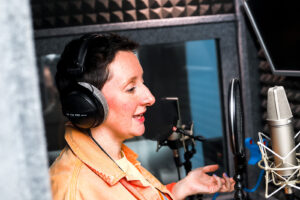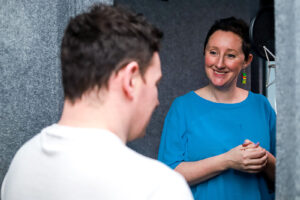Hello there,
Recently, I’ve seen loads of people asking how to make reading a script sound conversational – both in voiceover coaching and podcasting services. The conversational read is really hot right now. Everybody wants to be listening to stuff apparently like they’re down the pub with their mates or definitely just feeling like they’re not being sold to.
It’s really important for podcasters who are more comfortable working from a script. There are ways of making it sound conversational.
And for voiceover artists to sound relatable.
Of course if you’re a presenter then the ability to sight-read and make it sound really conversational and casual is important…
So here are my top tips on how to sound conversational when reading from a script…
Practice sight-reading every single day.
You can’t expect to just be good at sight-reading in a really natural fashion, that’s the basic bones of this. It takes practice, weirdly, to sound like you’re having a conversation. So do a bit of practice, whether it’s reading a bit of your novel outloud (sorry to the person sitting next to you in bed), reading some of your news app or even a few Instagram posts from people you like. They’re actually really great practice because they’re often written quite conversationally.
The conclusion of this tip is to just say words that you see on a page out loud to anyone, or no-one. I also suggest recording yourself doing it once in a while, because then you can start to check in on whether you sound conversational to you. Would you believe that you’re conversational? Or do you still sound like you’re reading things? Because you have to have an idea of what conversational sounds like in your voice.
When you write a script, write as you speak.
The best way to do this is to speak what you have to say into a transcription app such as Otter AI or even just your phone notes app. Review and tweak, then use that as your script.
We write thoughts in a much tidier form than we speak them, and if you want to sound like you’re not reading then the thought lengths and the structure of the thoughts needs to feel right. So instead of sitting down to write your podcast episode, speak it! You can speak it from some bullet points if there are points you know you want to cover, but just speak it first and then tidy it up.
There’s a bonus for your breath here too because you’ll know that your breath m is able to last through each thought length, because you did it originally when you were talking. No running out of breath before the end of the sentence! Happy days.
As a secondary benefit, you also get used to talking your thoughts out loud, which is really useful if eventually you would like to be somebody who doesn’t use a script and has the confidence to just riff off a few bullet points – so there’s quite a few benefits to writing your script as you speak.
Don’t be afraid to go off the book a wee bit.
Let those incidental words and sounds come in, those ‘umms’ and ‘ahhs’ and that thinking time. Speaking can be, and is, messy. And that’s fine. We listeners hear messy speech every single day and survive just fine!
A great exercise is to take the line that you want to say, and add an extra word at the start and at the end. So if your sentence is ‘it’s really easy to build voice training into your day’, I might instead look at my page and say ‘look, it’s really easy to build voice training into your day, I promise!’ and then it just makes it feel a little bit more conversational and a little bit less tidy – which I think is the key here. It also starts the energy before the really important part of the line, and it keeps the energy going until right past the important part of the line, which is a really great tip for voiceovers too – you can just leave a gap between the incidental words and the actual line that you’ve been scripted to say and edit the leading words and the lead out afterwards.
Try not to censor yourself too much.
… Or get caught up on sounding perfect. As I said in the previous point, conversation isn’t perfect and this of course, depends on the context of your speaking but it’s worth thinking about.
I worked with some people lately on genuinely messing up their voiceover delivery because the client wanted it to sound more natural. The age of sounding like everything is perfect, and only believing things which sound perfect, is over in many industries. So don’t be trying to clean up your accent or voice if you want your podcast to sound authentic anyway.
We do take for granted how much the average human is used to listening to and processing our very normal, flawed, lumpy and bumpy conversation. I don’t know about you but if I’m listening to someone talking about something they’re really passionate about, or being paid to pretend they’re passionate about – hello voiceovers, I don’t mind at all if they trip over their words a wee bit. It’s passion. I can feel it and I care about feeling their passion through the communication. I care about feeling inspired or motivated or outraged alongside them, that’s authenticity and conversation – not perfect words in the right and ‘correct’ order.
So let’s recap my top tips on how to sound conversational when you’re reading from a script…
- Practice sight reading every single day
- Write as you speak then use the transcribed text as your script
- Write your script but don’t be afraid to go off book
- Try not to make yourself sound perfect, because our ears are used to the imperfect.
Alright, there you go. Have a little play with a few of those tips next times you’re on the hunt for that elusive conversational read!





